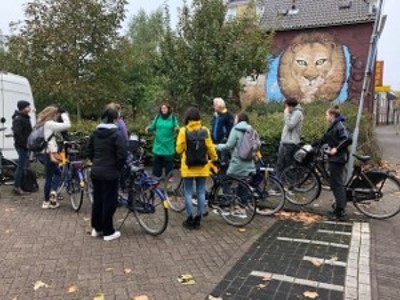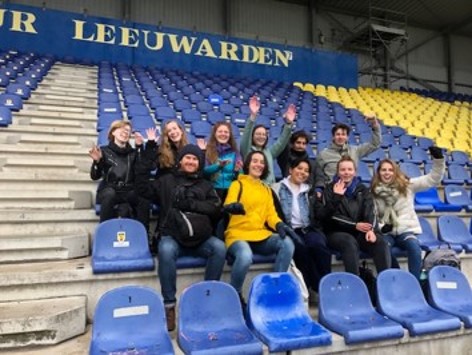Julia Brink: I believe in the importance of social perspective on climate change
| Date: | 14 December 2021 |

Julia Brink is studying a master in Climate Adaptation Governance at Campus Fryslân. She comes from a social sciences background and has a strong feeling of personal responsibility to be a positive actor in the global problem of climate change. In the interview, Julia shares her insights on the programme as well as some tips on how to approach climate change from our daily perspective.
“Bringing my share to solve the global problem”
The whole climate change problem always seemed very complex and important to do something about to me. During my bachelor in social studies I did a minor in environmental studies to learn more about it. Since then I really wanted to have a feeling of agency, bringing my share to solve the global problem. So when I came across the master in Climate Adaptation Governance it all seemed to fit together. There are of course many other programmes that look at rather technical solutions, but I do believe that social perspective is just as important so I thought this master would be a perfect match for me.
Small-scale educations open for discussions
I really like the campus in Leeuwarden and how small-scale it is. We have nice small groups in the master as well. This way you can have a lot more discussions and get really in depth of the material. The lecturers are really open for feedback on any downsides and I do feel like they try to incorporate the changes within the course even while it is happening. I also enjoy the content and topics of the courses.
Another thing I really like is the many field trips that we undertake within the master. This helps to orientate further than just the academic realm of the topic. It shows that there are also possibilities outside of doing research, which are personally really appealing to me.

Interplay of different topics
The most interesting parts of the programme for me are the courses in adaptation. All those frameworks are very complex and it is important to have an overview on how they all work together. And then I also really like that there are many courses in cultural geography that are more culture- and landscape-focused for example. All this knowledge was very applicable in the community-based adaptation course that followed. The social side of the city is what I’m most interested in, so I'm really looking forward to the course – Adaptation in Cities and City Planning in the next semester.
Social aspects
I would say you have to be a social student for this programme. Not necessarily an extravert that always wants to talk in lectures, but someone interested in a more people-focused perspective in the subjects they come across, as well as someone ready to work in groups with other students. The latter is very nice in my opinion, because it ensures you work with people who have a different academic background and also maybe from abroad, so you get many more viewpoints in that way. It is very difficult to come to an agreement with all the people but it is really important to work on those skills.
“There are many deadlines, but it is really doable”
I am quite a planner, I like to be prepared and have a sense of an overview of the upcoming deadlines and subsequent workload. There is a lot, but it is really doable as long as you keep it in mind.
I would say a typical day for me... This period I have one day off in a week and in the previous one we had two. I try to keep the weekends school-free as well by making the most of my study days. For example, on a typical school day when I have to start early I travel over here, take my notes in the lectures, come prepared. I like to read beforehand to know what kind of topics we are discussing and they also expect that from us in lectures. After school or on the train I like to read some more for the rest of the week and then I work on the assignments at home or here at the campus if it is group work.

What can we all do about climate change?
- Be conscious about your own consumption. Because it is really easy to buy a lot nowadays and everybody sometimes falls into that. Of course one person can only do so much but still it can have an impact in total.
- Make sure that you are up-to-date with the knowledge. Not really reading into it all the time, but keeping an eye if certain things are happening.
- Try to approach it as something that needs a system change. Not only individual but a collective, governmental and institutional action.
- Take breaks from the topic, because it can really get heavy and depressing. So it is also really important to keep yourself in check in that way. It’s really not what you can do in a day to fight climate change, but it is more about keeping your drive and motivation to tackle the problem.
- If you also want a sense of agency but cannot really find it in the academic world you can also join lots of groups that are working hard to tackle the problem locally, nationally or globally.
Start your application for the Msc Tourism Geography and Planning!

